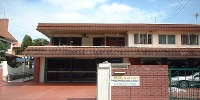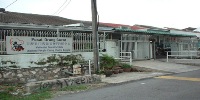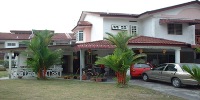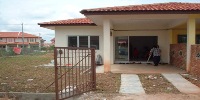By SHOBA MANO
One of the biggest challenges facing the disabled is their integration into society.
As Thomas Yeoh, one of the 12 disabled students who have completed a speech training course at the Voice Academy in Kuala Lumpur, says, “People sometimes donate money, wheelchairs and hearing aids, but what we really need are jobs.
 Loving work: Pua Ghin Chu, 25, (centre) Low Mee Li, 40 and Yeoh Kee Soon, 45, (left) work as deejays at AI FM.
Loving work: Pua Ghin Chu, 25, (centre) Low Mee Li, 40 and Yeoh Kee Soon, 45, (left) work as deejays at AI FM.“Nobody wants to live off charity the rest of his life. Holding a job gives us a sense of pride, self-worth and purpose,” says the 45-year-old, who has been wheelchair-bound for the last two years because of muscular dystrophy.
“I worked as a draughtsman until I became confined to a wheelchair. So now I have to learn other skills to obtain a job that I can do in spite of my disability,” says Yeoh, who along with course mates Ivy Pua Ghin Chu, Low Mee Li, 32, and BGF director Sia Siew Chin, 46, have been offered stints as deejays with RTM’s Chinese radio station AI FM.
Pua, a care and employment co-ordinator at Beautiful Gates Foundation for the Disabled (BGF) in Petaling Jaya, says the speech training course was conducted in Mandarin and focused on pronunciation and how to use voice more effectively.
Pua became disabled at 16, after surgery to remove a blood clot from her spine.
“Most physical disabilities do not affect a person’s mental faculties. Yet, a high percentage of the disabled are uneducated due to society’s poor acceptance of them, especially in schools.
“The infrastructure in schools is also not disabled-friendly. Moreover, many teachers and students don’t understand the difficulties faced by the disabled or don’t treat them with respect, which is why a large number drop out. The more educated members of the disabled community are usually those who became disabled later in life, after having obtained their tertiary education,” Pua points out.
Pua and her three compatriots will helm a programme for the disabled in April, thanks to an initiative by CIMB Bank Berhad, which sponsored their course and approached AI FM to broach the idea.
 Undergoing voice training.
Undergoing voice training.They recently hosted two Chinese New Year 2008 Specials on NTV7’s Chinese language programme called Finding Angels.
“The bank doesn’t just hand over sponsorship money, but believes in working with its beneficiaries to obtain the expected results,’’ says CIMB head of Community Link and CIMB Elements, Johnny Yong.
“This involves a lot of time and commitment. For instance, we had to convince the Voice Academy to enrol disabled students. We also spent a lot of time encouraging the disabled to take the course.”
According to AI FM programme manager, Ng Leng Leng, 40, the station pondered over the idea of disabled deejays after being approached by the bank.
“It’s the first time we are engaging disabled deejays. When I attended the graduation ceremony at Voice Academy, I heard Sia saying she wanted the public to know how the disabled felt, and not what the public believed they felt.
“Sia also said the disabled are victims of social prejudice rather than their disabilities. I was so moved by what she had said that I decided to have a radio programme by the disabled, for the disabled,” recalls Ng.
The programme format will include sharing diary entries and daily experiences. The disabled will be encouraged to submit short stories within 100 words. The winning entry will be read on air and receive a prize sponsored by CIMB.
“We will also discuss some basic dos and don’ts that the able-bodied can observe when interacting with the disabled. For example, one should not immediately lift a disabled person who has fallen down,’’ says Thomas.
“He should first squat and ask if the fallen person is hurt and what help he requires. Be sensitive to the type of disability when attempting to help the person. Don’t force a person with cerebral palsy to hold a pen, because he is not able to do so. We will also discuss the proper way to push a wheelchair, especially when going up an escalator or down a steep ramp,” says Thomas.
Ng says the station is excited about the show but notes that the facilities in their own building are not disabled-friendly.
“We have to carry the disabled deejays over one flight of stairs to the broadcasting room, which does not comfortably accommodate wheelchairs. The deejays are also not able to reach all the switches and still need able-bodied people to help them with the console. These are real-life problems, which the disabled can easily overcome if the infrastructure is built to suit them,” she says.
Ng thinks it’s a shame the disabled are being deprived of jobs they can quite easily do simply because of infrastructural problems. She hopes other companies, too, will think about the issue and consider providing employment opportunities for the disabled.
Source : http://thestar.com.my/lifestyle/story.asp?file=/2008/3/1/lifeliving/20236908&sec=lifeliving





